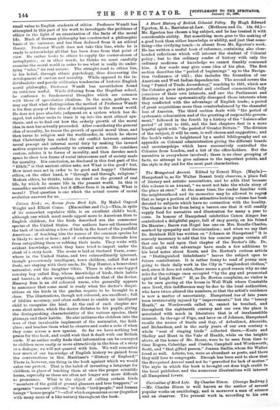Citizen Bird ; or, Scenes from Bird Life. By Mabel
Osgood Wright and Elliott Cones. (Macmillan and Co.)—This, in spite
of its somewhat repulsive title, is an excellent child's book, although one which must needs appeal more to American than to English children, for the birds described are the commoner species of the United States. Our authors have set themselves the task of inculcating a love of birds in the heart of the youthful American ; of teaching him the names of the common species he
is likely to meet or hear ; and of endeavouring to dissuade him from catapulting them or robbing their nests. They write with evident knowledge, which they have tried to impart under the cloak of a story-book. The scene is laid at Orchard Farm, some- where in the United States, and two extraordinarily ignorant, though precociously intelligent, town children, called Nat and Dodo, are staying with their uncle, Dr. Boy Hunter, a benevolent naturalist, and his daughter Olive. There is also a one-legged country boy called Rap, whose knowledge of birds, their habits and haunts, is often surprising, and exceeds that of the doctor. Mammy Bun is an old coloured nurse, who generally appears to announce that some meal is ready when the doctor's disqui- sitions on the birds in the garden require to be brought to a close. The illustrations, though not coloured, are excellent ; full of lifelike accuracy, and often sufficient to enable an intelligent child to recognise the bird. At the end of each chapter are some short notes, which the doctor dictates to his pupils, giving the distinguishing characteristics of the various species, their plumage and their habits. He also initiates the children into the uses of that invaluable implement of the naturalist, the field- glass ; and teaches them what to observe and make a note of when they come across a new species. So far we have nothing but praise for this book, and could wish that it dealt with our British birds. If an author really finds that information can be conveyed to children more easily or more attractively in the form of a story or a dialogue, we will not quarrel with him. We well remember how much of our knowledge of English history we gained from the conversations in Mrs. Markham's "History of England." There is, however, one thing in the book against which we would enter our protest. That is the habit of inventing a language for children, in place of teaching them at once the proper scientific terms, especially as these are often not longer nor more difficult to pronounce. What is the object of calling certain birds "members of the guild of ground gleaners and tree trappers," or migrants "summer citizens," or birds "bird-people," and human beings " house-people " ?—a11 of which expressions occur (together with many more of a like nature) throughout the book. A Short History of British Colonial Policy. By Hugh Edward Egerton, M.A., Barrister-at-Law. (Methuen and Co. 128. 6d.)— Mr. Egerton has chosen a big subject, and he has treated it with considerable ability. But !something more goes to the making of a good book than either knowledge or ability, and just that some- thing—the vivifying touch—is absent from Mr. Egerton's work. He has written a useful book of reference, containing also clear- headed reflections which will interest the student of Colonial policy ; but to the ordinary reader of history with only the ordinary modicum of knowledge we cannot frankly commend him. A few words may give some idea of his plan. The first section describes the "period of beginnings" up to the Naviga- tion Ordinance of 1651; this includes the formation of our American and West Indian dependencies. The second covers the long "Period of Trade Ascendency," reaching to 1831, which saw the Colonies grow into powerful and civilised communities fully conscious of their own interests, and saw the Parliament and Ministry at home systematically disregard those interests when they conflicted with the advantage of English trade ; a period of great acquisitions more than counterbalanced by the shameful loss of America. The third section deals with "the period of systematic colonisation and of the granting of responsible govern- ment," followed in the fourth by a history of the "Laissez-aller period" of 1861 to 1885, and the last chapters deal in a more hopeful spirit with "the period of Greater Britain." The division of the subject, it will be seen, is well chosen and suggestive; and the book's value is heightened by a useful bibliography and an appendix on Colonial administration giving the different boards and secretauships which have successively controlled the Colonies from London, and a list of the office-holders. But the narrative is everywhere involved ; there is no clear grouping of facts, no attempt to give salience to the important points, and the style is dry and for the most part characterless.


















































 Previous page
Previous page